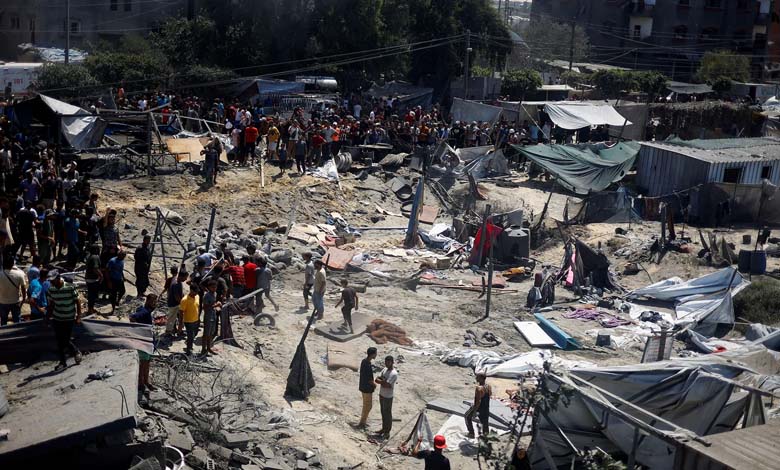After Gaza: Questions over the Fate of Al-Mawasi and the Crowded Central Camps

Following Israel’s announcement of its decision to seize control of Gaza City, attention is turning to the next stage of the military operation.
Many are now asking whether the Al-Mawasi area, west of Khan Younis, and the camps in the central province could face a similar escalation, despite their heavy concentration of displaced people and the complexity of the humanitarian situation.
-
Worst-case famine scenario: UN report warns of humanitarian catastrophe in Gaza
-
Netanyahu Caught in the Military Trap over Gaza: Generals Rebel, Soldiers Absent
As growing numbers of Israelis express concern over a conflict that has dragged on for 22 months, Prime Minister Benjamin Netanyahu said last week that the Security Cabinet had ordered the dismantling of Hamas strongholds not only in Gaza City but also in the “central camps” and Al-Mawasi.
A source familiar with the matter, speaking to the Associated Press on condition of anonymity as they were not authorized to speak to the media, confirmed that Israel is planning operations in both areas.
-
What Is the Fate of the Gaza Truce? Hamas Responds to Witkoff
-
A Break in Khan Younis Gets Elite Israeli Unit Pulled from Gaza
The central province’s camps — home to more than half a million displaced people according to the UN — were not included in Friday’s Israeli announcement, for reasons that remain unclear. Netanyahu nevertheless faced criticism within his own governing coalition over the weekend, with some arguing that targeting only Gaza City was insufficient.
The province includes the camps of Deir al-Balah, Nuseirat, Bureij, and Maghazi, along with the towns of Zawaida, Wadi al-Salqa, and al-Musaddar. Nuseirat and Bureij border the Netzarim Corridor, currently occupied by Israeli forces, while Deir al-Balah sits on the coastal road to Al-Mawasi, a strategic position along two main routes traversing the strip.
These camps make up roughly 10% of Gaza’s total area. They were built after 1948 to house Palestinians displaced from their villages and towns.
-
Gaza Truce : Just 200 Meters Separate Israel and Hamas
-
“I can’t walk anymore”: When journalists, the hungry, and medics collapse in Gaza
A night of fire
Late on Sunday, Gaza was hit by heavy Israeli airstrikes. Al Jazeera reported that two of its journalists, Anas al-Sharif and Mohammed Qareqa, were killed in a strike that hit a press tent adjacent to the Al-Shifa Medical Complex.
Rami Mehnna, administrative director of nearby Al-Shifa Hospital, said the strike hit the Al Jazeera journalists’ tent just outside the hospital walls. Three other journalists, including photographers, and a driver were also killed.
-
From Displacement Camps to UN Facilities: In Gaza, No One Is Spared
-
UN warns of suffocating Deir al-Balah in Gaza… the last lifeline
On Sunday, before an emergency meeting of the UN Security Council, Netanyahu told foreign media: “Our goal is not to occupy Gaza, but to liberate it.” He said his objectives included disarming the strip, ensuring “supreme security control” by Israel, and placing civil administration in the hands of a non-Israeli entity.
Netanyahu again blamed Hamas for much of Gaza’s suffering, including civilian deaths, destruction, and the shortage of aid. Hamas responded with a lengthy statement calling his remarks “blatant lies.”
-
“I pretended to be dead to survive”: How Gaza’s breadlines turned into graveyards
-
Israel Punishes UN over Gaza Operations: Three Visas Denied
Between diplomacy and the battlefield
Diplomatically, the United States defended Israel and rejected genocide accusations, while China, Russia, and other Security Council members voiced concern over “collective punishment” and “reckless escalation.” Even Germany — one of Israel’s closest allies — suspended certain military equipment exports amid growing international criticism.
On the ground, reports continued of Palestinians killed while trying to access aid. Hospitals recorded at least 31 fatalities in separate incidents near corridors and distribution sites under Israeli control, including in Morag, Netzarim, and the Tineh area in southern Gaza. Witnesses accused Israeli forces of firing on the crowds, a claim the military denied.
-
Gaza Truce: U.S. Positive Signal, Israeli Flexibility and a U.N. Alarm
-
Gaza: 20 Dead in Stampede for Aid in Khan Younis
The humanitarian crisis is deepening: according to Gaza’s Health Ministry, 100 children have died of hunger since the start of the war, along with 117 adults from malnutrition since June. The ministry said the overall death toll stands at 61,400, nearly half of them women and children. UN officials warn that the situation has moved from an “imminent famine” to a famine “already underway.”












